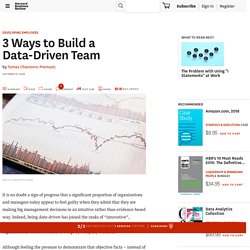

8 Things Leaders Do That Make Employees Quit. Algorithms are becoming increasingly relevant in the workplace.

From sifting through resumes to deciding who gets a raise, many of these new systems are proving to be highly valuable. But perhaps their most impressive, and relevant, capability is predicting which employees will quit. IBM is in the process of patenting an algorithm that can supposedly predict flight risk with 95% accuracy. Given that we are in a candidate-driven market, this is a significant innovation. There are now more job openings in the U.S. than there are unemployed Americans. Losing an employee can have a drastic effect on team morale, and result in a domino effect that leads to poor performance and productivity. But not every company has a fancy algorithm to help them out. Mistake 1: Setting inconsistent goals or expectations. Consider this scenario: A sales representative at a rental car company has to choose between serving her next client, or correctly logging her previous client’s information into the system. 8 Ways Leaders Delegate Successfully. Executive Summary For many leaders, delegating feels like something they know they should do, but don’t do.

Senior leaders often struggle with knowing what they can delegate that would actually feel helpful to them, or how to delegate responsibility and not just tasks, or what responsibilities could serve as a learning and growth opportunity for others below them. Before leaders can successfully and effectively delegate, they need to understand their own resistance. How Successful People Make Decisions Differently. Photo by Flickr user Robert Couse-Baker We make hundreds of big and small decisions every day.

Many of these decisions are opportunities that can change your life, yet many of us don’t know how to assess a decision to yield a good outcome, says Mike Whitaker, author of The Decision Makeover: An Intentional Approach To Living The Life You Want. “Decisions are forks in the road,” he says. “Life doesn’t happen to us; we are an active participant. We get out of life what we choose.” More than just a choice in the moment, good decision-making takes discipline, says Whitaker. When you have a few tools, you can confidently navigate the right option each time, says Whitaker. 7 Harsh Truths That Will Improve Your Leadership Skills Overnight. You Can Be a Great Leader and Also Have a Life. Executive Summary Intense and all-consuming work styles are often celebrated as the only way to get to the top and be a super productive leader.

But does it have to be that way? Over the last 20 years, a group of executives has been meeting and sharing innovative ideas for finding time for work, family, and life. For leaders to stand up to status quo pressures and make work-life balance a priority, the group found that they needed to cultivate skills around three relationships: learning to work differently with their teams at work, making a plan with their families to put home and family first, and shifting their own mindsets — to not only believe change is truly possible, but to give themselves permission to try, and speak up about it. The stories of three leaders exemplify how this can be done. Tesla and Space X CEO Elon Musk tweets that no one changed the world working 40 hours a week.
Why core values are important to an organization. 3 Ways to Build a Data-Driven Team. Executive Summary As organization turbocharge their ability to gather more and more data, what matters most is having people who can ask the right questions of the data.

Although people will differ in their general predisposition towards critical thinking, you can help them develop whatever potential they have if you put in place the right incentives, give people accurate feedback, and establish an informal and non-hierarchical learning culture where people can share views and ideas. For instance, at AirBnB, employees post problems into an internal knowledge repository that allows other people to provide answers or solutions.
There are also psychological qualities determining whether individuals will learn to think more empirically and quantitatively. It is no doubt a sign of progress that a significant proportion of organizations and managers today appear to feel guilty when they admit that they are making big management decisions in an intuitive rather than evidence-based way. 1. 2. 1 Super Rare Sign That Proves You Are Meant to Lead People (but May Cause a Gag Reflex for Most) Research on positive organizational scholarship has revealed a powerful weapon for creating happier workplace cultures and more loyal and committed employees who produce better work.

It comes down to one word: kindness. Before I get into the business case for kindness, I have to ask: Why don't we see more kindness at work? Why aren't more decision makers jumping on this bandwagon, if it means leveraging it for business impact and bottom line results? Because the perception of this soft and fuzzy word implies that it's only fit for "doormat" and weak leaders, much like other counterintuitive powerhouse leadership words like empathy, transparency, and vulnerability. And that's a shame. Upon closer inspection, nothing could be further from the truth than the belief that kindness is not fit for business. 1. 2. 3. 4.